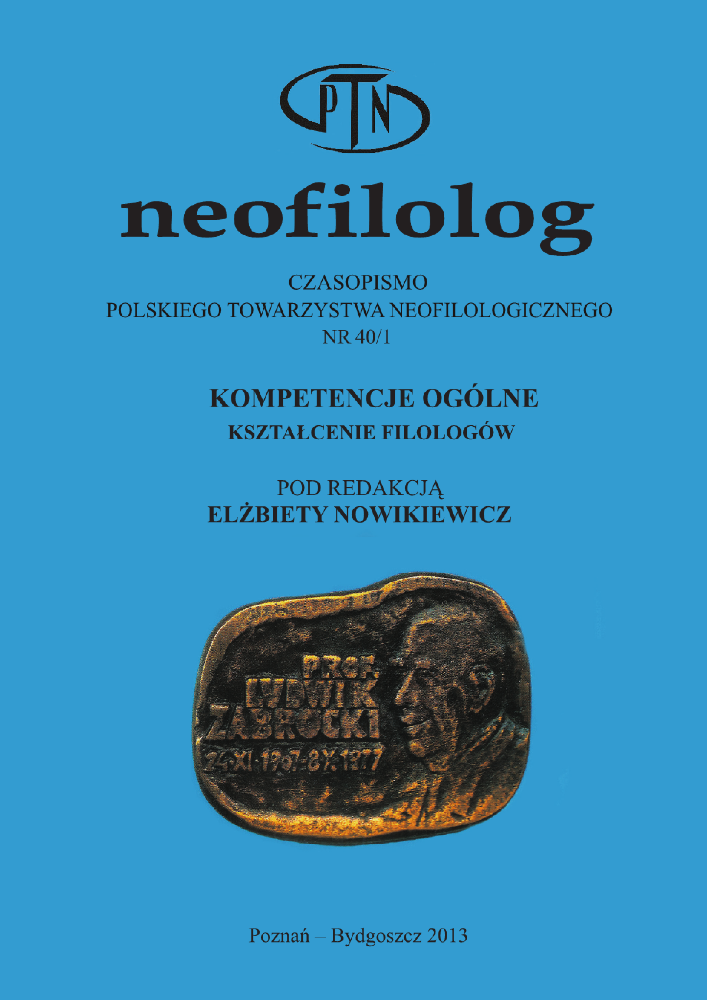Résumé
The following article refers to the benefits and possible uses of English in the process of learning German. The author presents and explores the results of an inquiry conducted among students of Applied Linguis-tics at the Kazimierz Wielki University in Bydgoszcz who learn English as L1 and German as L2, which demonstrates their effective language learning strategies. The study shows conclusions drawn from the students’ answers and with examples shows that English can be a source for positive transfer to German.Références
Arabski, J. 1997. Przyswajanie języka obcego i pamięć werbalna. Katowice: Wydawnictwo „Śląsk”.
Bawej, I. 2011. « Język polski jako czynnik ułatwiający naukę języka niemieckiego ». (w) Nauczanie języka obcego a specyficzne potrzeby uczących się. O kompetencjach, motywowaniu i strategiach (red. Knieja, S. Piotrowski). Lublin: Towarzystwo Naukowe KUL: 93-105.
Cichoń, M. 2011. « Zdolny uczeń – autonomiczny uczeń: jak rozwijać skuteczne strategie uczenia się na lekcji języka obcego ». (w) Neofilolog. 36: 293-302.
Decke-Cornill, H. i Küster, L. 2010. Fremdsprachendidaktik. Eine Einführung. Tübingen: Narr Verlag.
Hufeisen, B. 1999. « Deutsch als zweite Fremdsprache ». (w) Fremdsprache Deutsch 1: 4-6.
Komorowska, H. 1980. Nauczanie gramatyki języka obcego a interferencja. Warszawa: WSiP.
Latkowska, J.1996. « Rola i miejsce języka ojczystego w procesie nauczania języka obcego. Część II ». Języki Obce w Szkole 4: 300-306.
Mrozowska, H. 1999. « Świadomość językowa w nauczaniu języka obcego ». (w) Języki Obce w Szkole 1: 4-10.
Pawlak, M. 2009. « Metodologia badań nad strategiami uczenia się języka obcego ». (w) Neofilolog 32: 65-83.
Pfeiffer, W. 2011. Nauka języków obcych. Od praktyki do praktyki. Poznań: Wagros.
Rampillon, U. 1985. Lerntechniken im Fremdsprachenunterricht. Ismaning: Max Hueber Verlag.
Selinker, L. 1972. « Interlanguage ». IRAL 10: 209-230.
Sobolew, L. 1987. « Strategie uczenia się języka obcego ». (w) Języki Obce w Szkole. 397-403.
Strasser, M. 2008. Verständigungsstrategien bei sehr geringen Sprachkenntnissen. Eine explorative Studie zur Kommunikation unter Bedingungen der Interkomprehension. Wien: Praesens Verlag.
Szarska-Wieruszewska, J. 2004. Lernstrategien als Grundlage der lerntypischen Fehlerbehandlungen. Forschungsstudien am Beispiel der Deutsch lernenden, polnischen Studenten. Hamburg: Verlag Dr. Kovać.
Tobiasz, L. 2009. « Język angielski w procesie uczenia się języka niemieckiego – pomoc czy przeszkoda? Krytyczna analiza ankiet przeprowadzonych wśród studentów anglistyki Uniwersytetu Śląskiego w grupach tłumaczeniowych z językiem niemieckim ». (w) Neofilolog 33: 257-268.
Wendt, M. 1993. Strategien des fremdsprachlichen Handelns. Tübingen: Gunter Narr Verlag.
Wiese, H. 1994. « Integration des Transfers in eine Theorie des Zweitspracherwerbs ». (w) Info DaF 21. 4: 397-408.
Wille, L. i Wawrzyniak, Z. 2005. Język angielski kluczem do języka niemieckiego. Język niemiecki kluczem do języka angielskiego. Gramatyka konfrontatywna niemiecko-angielska w ćwiczeniach. Zielona Góra: Kanion.
Licence
© Izabela Bawej 2019

Ce travail est disponible sous licence Creative Commons Attribution - Pas de Modification 4.0 International.
Auteurs :
Les auteurs de textes acceptés pour publication dans la revue Neofilolog sont tenus de remplir, signer et renvoyer à l'adresse de la rédaction, un accord sur l'octroi d'une licence gratuite pour les œuvres, avec obligation d'accorder une sous-licence CC.
En vertu de cet accord, les auteurs des textes publiés dans la revue Neofilolog accordent à l'Université Adam Mickiewicz de Poznań une licence non exclusive et gratuite et permettent l'utilisation de la sous-licence Creative Commons Attribution-NoDerivatives 4.0 International (CC BY-ND 4.0).
Les auteurs se réservent le droit de disposer librement de l'œuvre.
Utilisateurs :
Les utilisateurs d'Internet intéressés ont le droit d'utiliser les œuvres publiées à partir de l'année 2017 sous réserve des conditions suivantes :
- reconnaissance de la qualité d'auteur - l'obligation de fournir des informations sur la qualité d'auteur, le titre, la source (liens vers l'œuvre originale, DOI) et la licence, ainsi que l'œuvre distribuée ;
- sans créer d'œuvres dérivées - l'œuvre doit être conservée dans sa forme originale, p. ex. les traductions ou les interprétations ne peuvent être distribuées sans le consentement de l'auteur.
Tous les textes publiés sont soumis au droit d'auteur.
Autres :
L'Université Adam Mickiewicz de Poznań se réserve le droit à la revue dans son ensemble (mise en page, forme graphique, titre, conception de la couverture, logo, etc.).
.
